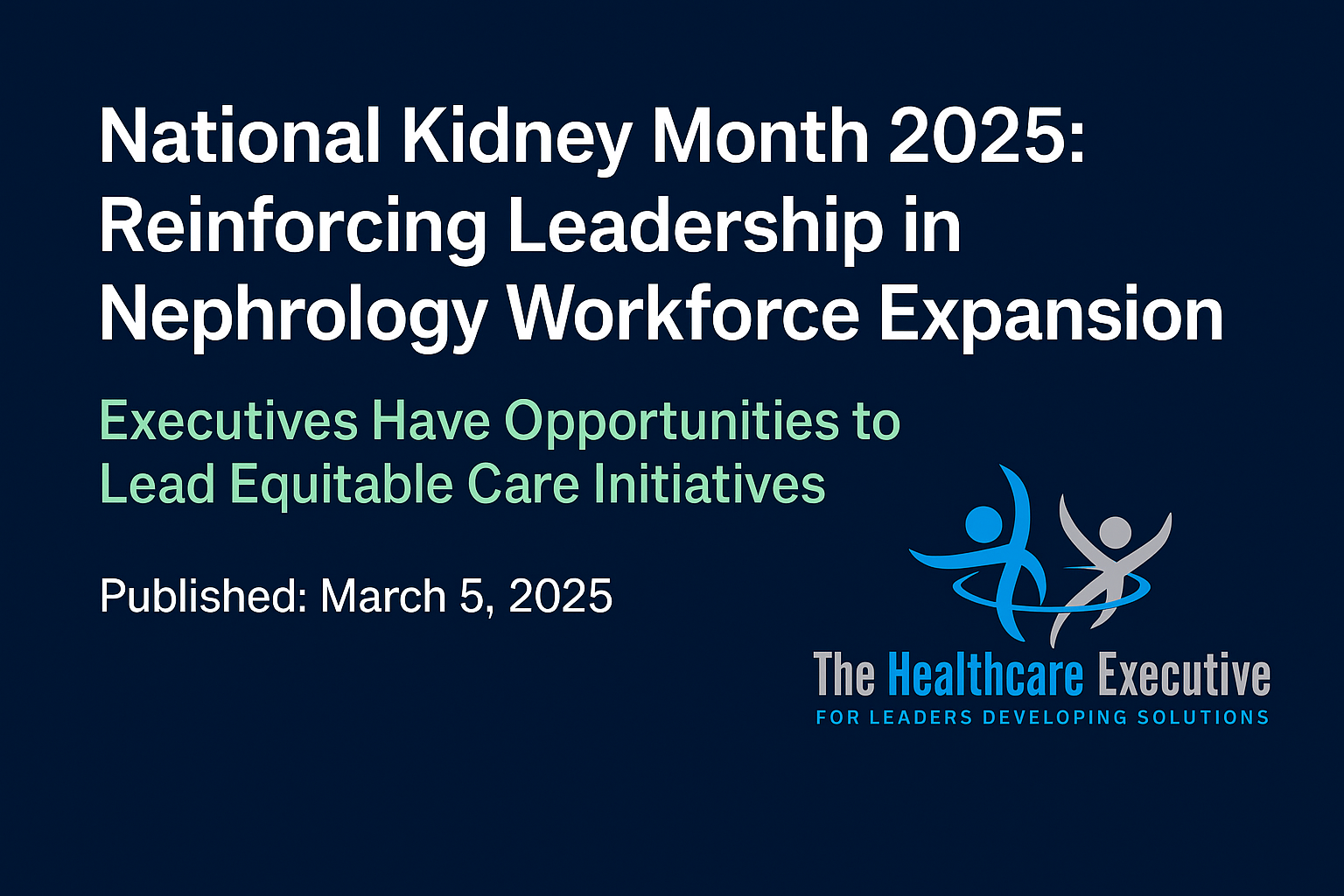National Kidney Month 2025: Executive Strategies to Advance Early Detection and Chronic Care Innovation

- Posted by Greg Wahlstrom, MBA, HCM
- Posted in Health Observance Calendar
Hospital Leaders Must Elevate CKD Screening, Integrate Care Teams, and Improve Equity in Transplant Referrals
Published: March 5, 2025
March is National Kidney Month, a time for healthcare executives to prioritize kidney health as a systemic priority—not a siloed specialty. Over 37 million U.S. adults live with chronic kidney disease (CKD), yet 90% are unaware they have it. Executives must lead efforts to embed early CKD screening protocols across primary care, cardiology, and endocrinology departments. At Mount Sinai Health System, cross-specialty integration has led to predictive analytics tools that flag at-risk patients using EHR data. Such innovation allows hospital systems to intervene earlier and more efficiently. Forward-looking CEOs will measure success not just in treatment outcomes, but in detection metrics that prevent irreversible decline.
Disparities in kidney care remain persistent, especially among Black, Hispanic, Native American, and low-income populations. Studies show these communities are more likely to experience kidney failure but are less likely to be referred for transplants or specialist care. The National Kidney Foundation of New England has pioneered equity dashboards for transplant centers, measuring disparities in referrals and dialysis outcomes. Executives must embed similar analytics into their organizational scorecards and link equity performance to executive incentives. Strategic leaders will also bolster culturally tailored outreach through partnerships with FQHCs and community organizations. Equity is no longer a moral side note—it’s a strategic and operational imperative.
Transplant access remains a critical bottleneck in kidney care. Waitlists continue to grow while thousands of viable organs are discarded annually due to process inefficiencies. At Oregon Health & Science University (OHSU), process redesign teams have reduced referral-to-transplant wait times by 22% through digital referrals and centralized tracking systems. Hospital executives should benchmark these operational reforms and apply Lean or Six Sigma strategies to improve throughput. Partnering with organ procurement organizations and utilizing predictive transplant eligibility tools can also yield gains. Effective transplant strategy isn’t just clinical—it’s a logistics and leadership challenge that must be owned in the C-suite.
Whole-person nephrology must be the next frontier in kidney care innovation. Beyond dialysis, patients need wraparound services that address nutrition, mental health, housing stability, and financial literacy. At UW Health in Wisconsin, nephrology teams have added social workers and registered dietitians to outpatient kidney clinics, improving both quality metrics and patient experience. Hospital leaders should embed social determinants of health (SDOH) into kidney care pathways and use real-time data to intervene early. Multidisciplinary care teams—coordinated by executive vision—can reduce costly hospitalizations while improving patient retention and outcomes. Preventing end-stage renal disease begins upstream, with executive-led investments in system redesign.
Data transparency and public reporting will define future success in kidney care delivery. The U.S. Renal Data System (USRDS) offers valuable benchmarking tools for readmissions, dialysis quality, and mortality outcomes. Hospital executives should routinely monitor these national benchmarks and publish institutional data as part of annual community benefit reports. Leaders who lean into transparency build stakeholder trust, support compliance, and drive accountability. In National Kidney Month 2025, the time has come for hospital executives to reframe kidney care as an enterprise-wide responsibility, not an isolated subspecialty. Leadership in this domain will define the next era of chronic care innovation.
Discover More on Enterprise-Wide Chronic Disease Strategy
Explore how your organization can redesign care for chronic conditions like kidney disease by adopting interdisciplinary models, digital coordination tools, and population-level risk forecasting.
Internal Links
- The CEO’s Guide to Value-Based Care in 2025
- Green Hospitals: Leading the Way in Climate-Conscious Healthcare



